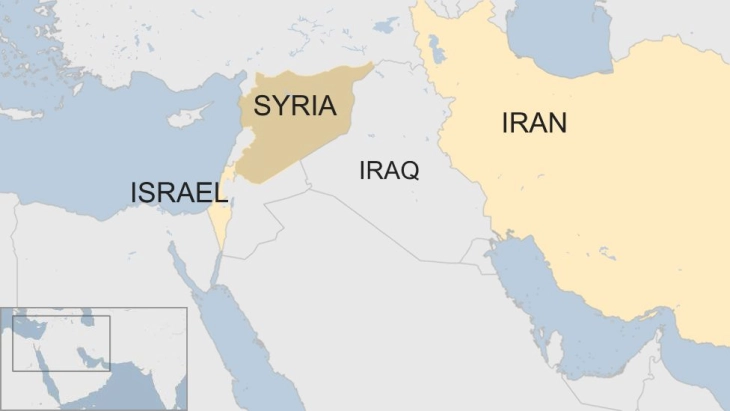German diplomats visit Damascus in outreach to Syria's new leaders
- German diplomats held talks in Damascus on Tuesday with Syria's new transitional government, the latest in a series of countries seeking to re-establish ties following the sudden fall of longtime ruler Bashar al-Assad.

Berlin/Beirut, 17 December 2024 (dpa/MIA) - German diplomats held talks in Damascus on Tuesday with Syria's new transitional government, the latest in a series of countries seeking to re-establish ties following the sudden fall of longtime ruler Bashar al-Assad.
The German delegation met with representatives of the hardline Islamist group Hayat Tahrir al-Sham (HTS), which led last week's overthrow of al-Assad's forces.
"The talks focused on the political transition process and our expectations regarding the protection of minorities and women's rights in order to support peaceful development in Syria,’ the German Foreign Office said in Berlin.
According to the statement, a representative of the HTS responsible for international contacts and the transitional government's education minister took part in the talks in the Syrian capital.
In addition, meetings were held with representatives of civil society and religious communities. The delegation also undertook an "initial inspection of the German Embassy building in Damascus."
The delegation, led by Middle East envoy Tobias Tunkel, also included a representative of the German Development Ministry.
The meetings came after British diplomats held talks on Monday with HTS leader Ahmad al-Sharaa, formerly known by his nom de guerre Mohammed al-Joulani.
Last week, an alliance of insurgents led by HTS scored a rapid series of victories over al-Assad's forces and captured Damascus. Al-Assad fled the country for Russia, where he has since been granted asylum.
Cautious outreach
HTS leaders have sought to signal moderation and expressed their intention of leading Syria toward stability and toleration of minorities.
The group, however, has past ties to the terrorist groups Islamic State and al-Qaeda. The European Union, the United States and others have designated HTS as a terrorist organization and put the group under sanctions.
A German Foreign Office spokeswoman said HTS would be judged "by their actions."
"Syria must neither become a pawn of foreign powers nor an experiment by radical forces. We know where HTS comes from and are aware of its origins in the al-Qaeda ideology," she noted.
Meanwhile, the EU announced on Tuesday that it would reopen its representation in Damascus, after making contact with the new Syrian leadership on Monday.
"Now we have to step up and continue our direct engagement with HTS and other factions," European Commission President Ursula von der Leyen said at talks in Ankara with Turkish President Recep Tayyip Erdoğan.
Tehran keeps embassy shut
Iran is keeping its Damascus embassy closed for the time being, a Foreign Ministry spokesman said in Tehran, pointing to "political and security-related preparations," in comments carried by the ISNA news agency.
In the upheaval following the overthrow of al-Assad, insurgents stormed the Iranian embassy in Damascus and, according to Iranian media reports, thoroughly devastated it.
For Tehran, al-Assad was a strategically important ally in its front against arch-enemy Israel. Syria served as a corridor for Iranian arms shipments to the Hezbollah militia in Lebanon and enjoyed generous Iranian financial support.
Evidence being destroyed
Amid the flurry of international diplomacy, a UN body established to investigate crimes under international law committed in Syria aims to be on site soon to secure evidence that is being destroyed daily, its head said in Geneva.
Robert Petit, the chief of the International, Impartial and Independent Mechanism, said the fall of al-Assad's regime created the opportunity to gather evidence on site.
The former Canadian prosecutor has applied to Syrian ambassadors to the UN in New York and Geneva for permission for his team to enter Syria.
The transitional government was aware of the need to secure evidence, Petit said. He added that he had a long list of suspects, some of whom had fled abroad.
The IIIM was tasked by the UN General Assembly in 2016 with investigating and prosecuting those responsible for the most serious crimes committed in Syria since March 2011, when a violent crackdown on protests triggered the country's civil war.
Petit said that 283 terabytes of data had been collected, some of it by civil society groups outside Syria. Several countries had made use of this evidence to try and convict criminals, he said.
Fighters to join state army
In Damascus, Syria's de facto leader al-Sharaa announced plans to dissolve the country's many armed groups and integrate their fighters into a state army.
"The fighters are being readied to join the Defence Ministry and will all be subject to the law," the head of HTS declared at a meeting with the Druze community, according to the group.
"We need the mindset of the state, not the mindset of the opposition," al-Sharaa was quoted as saying. For the country's diverse ethnic groups to coexist, he said that a "social contract" was necessary to ensure "social justice."
Following al-Assad's overthrow, HTS had relieved all soldiers of the state army from service.
In addition, Israel's military claims to have destroyed more than 80% of the military capabilities of Syria's army, in unprecedented attacks on the neighbouring country.
MIA file photo







